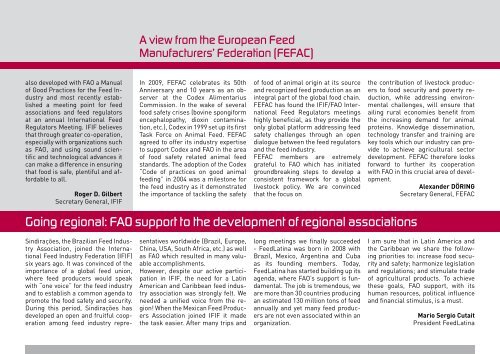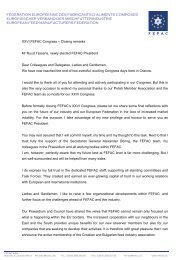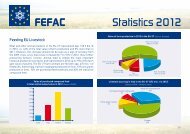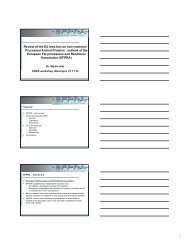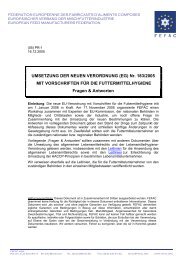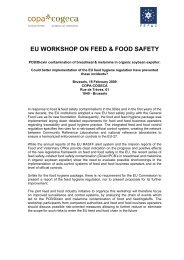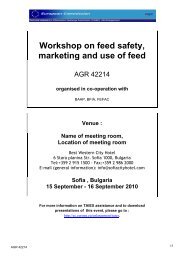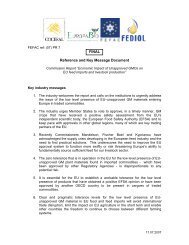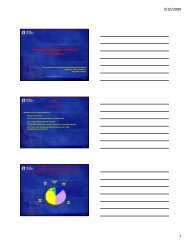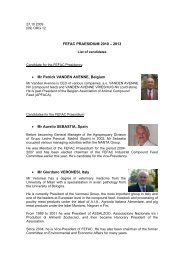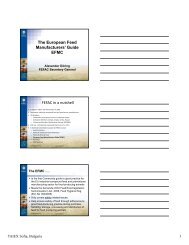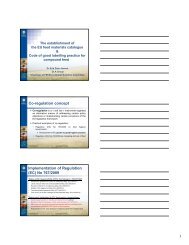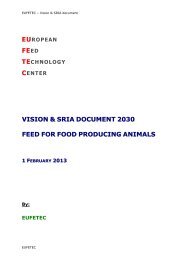Brochure (PDF) - Fefac
Brochure (PDF) - Fefac
Brochure (PDF) - Fefac
Create successful ePaper yourself
Turn your PDF publications into a flip-book with our unique Google optimized e-Paper software.
also developed with FAO a Manual<br />
of Good Practices for the Feed Industry<br />
and most recently established<br />
a meeting point for feed<br />
associations and feed regulators<br />
at an annual International Feed<br />
Regulators Meeting. IFIF believes<br />
that through greater co-operation,<br />
especially with organizations such<br />
as FAO, and using sound scientific<br />
and technological advances it<br />
can make a difference in ensuring<br />
that food is safe, plentiful and affordable<br />
to all.<br />
Roger D. Gilbert<br />
Secretary General, IFIF<br />
A view from the European Feed<br />
Manufacturers’ Federation (FEFAC)<br />
In 2009, FEFAC celebrates its 50th<br />
Anniversary and 10 years as an observer<br />
at the Codex Alimentarius<br />
Commission. In the wake of several<br />
food safety crises (bovine spongiform<br />
encephalopathy, dioxin contamination,<br />
etc.), Codex in 1999 set up its first<br />
Task Force on Animal Feed. FEFAC<br />
agreed to offer its industry expertise<br />
to support Codex and FAO in the area<br />
of food safety related animal feed<br />
standards. The adoption of the Codex<br />
“Code of practices on good animal<br />
feeding” in 2004 was a milestone for<br />
the feed industry as it demonstrated<br />
the importance of tackling the safety<br />
of food of animal origin at its source<br />
and recognized feed production as an<br />
integral part of the global food chain.<br />
FEFAC has found the IFIF/FAO International<br />
Feed Regulators meetings<br />
highly beneficial, as they provide the<br />
only global platform addressing feed<br />
safety challenges through an open<br />
dialogue between the feed regulators<br />
and the feed industry.<br />
FEFAC members are extremely<br />
grateful to FAO which has initiated<br />
groundbreaking steps to develop a<br />
consistent framework for a global<br />
livestock policy. We are convinced<br />
that the focus on<br />
Going regional: FAO support to the development of regional associations<br />
Sindirações, the Brazilian Feed Industry<br />
Association, joined the International<br />
Feed Industry Federation (IFIF)<br />
six years ago. It was convinced of the<br />
importance of a global feed union,<br />
where feed producers would speak<br />
with “one voice” for the feed industry<br />
and to establish a common agenda to<br />
promote the food safety and security.<br />
During this period, Sindirações has<br />
developed an open and fruitful cooperation<br />
among feed industry repre-<br />
sentatives worldwide (Brazil, Europe,<br />
China, USA, South Africa, etc.) as well<br />
as FAO which resulted in many valuable<br />
accomplishments.<br />
However, despite our active participation<br />
in IFIF, the need for a Latin<br />
American and Caribbean feed industry<br />
association was strongly felt. We<br />
needed a unified voice from the region!<br />
When the Mexican Feed Producers<br />
Association joined IFIF it made<br />
the task easier. After many trips and<br />
long meetings we finally succeeded<br />
- FeedLatina was born in 2008 with<br />
Brazil, Mexico, Argentina and Cuba<br />
as its founding members. Today,<br />
FeedLatina has started building up its<br />
agenda, where FAO’s support is fundamental.<br />
The job is tremendous, we<br />
are more than 30 countries producing<br />
an estimated 130 million tons of feed<br />
annually and yet many feed producers<br />
are not even associated within an<br />
organization.<br />
the contribution of livestock producers<br />
to food security and poverty reduction,<br />
while addressing environmental<br />
challenges, will ensure that<br />
ailing rural economies benefit from<br />
the increasing demand for animal<br />
proteins. Knowledge dissemination,<br />
technology transfer and training are<br />
key tools which our industry can provide<br />
to achieve agricultural sector<br />
development. FEFAC therefore looks<br />
forward to further its cooperation<br />
with FAO in this crucial area of development.<br />
Alexander DÖRING<br />
Secretary General, FEFAC<br />
I am sure that in Latin America and<br />
the Caribbean we share the following<br />
priorities to: increase food security<br />
and safety; harmonize legislation<br />
and regulations; and stimulate trade<br />
of agricultural products. To achieve<br />
these goals, FAO support, with its<br />
human resources, political influence<br />
and financial stimulus, is a must.<br />
Mario Sergio Cutait<br />
President FeedLatina


